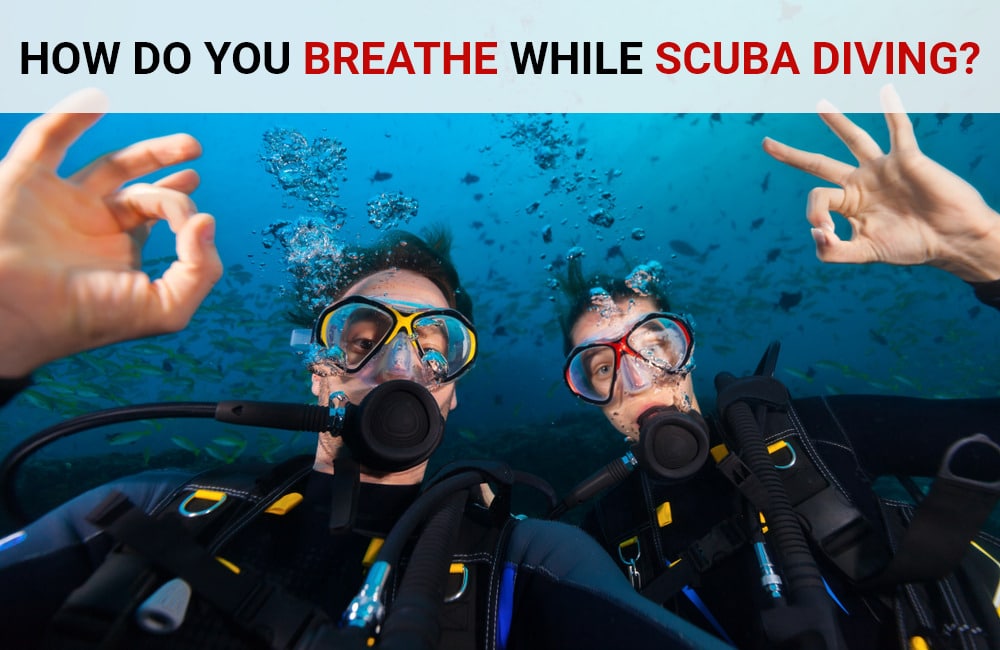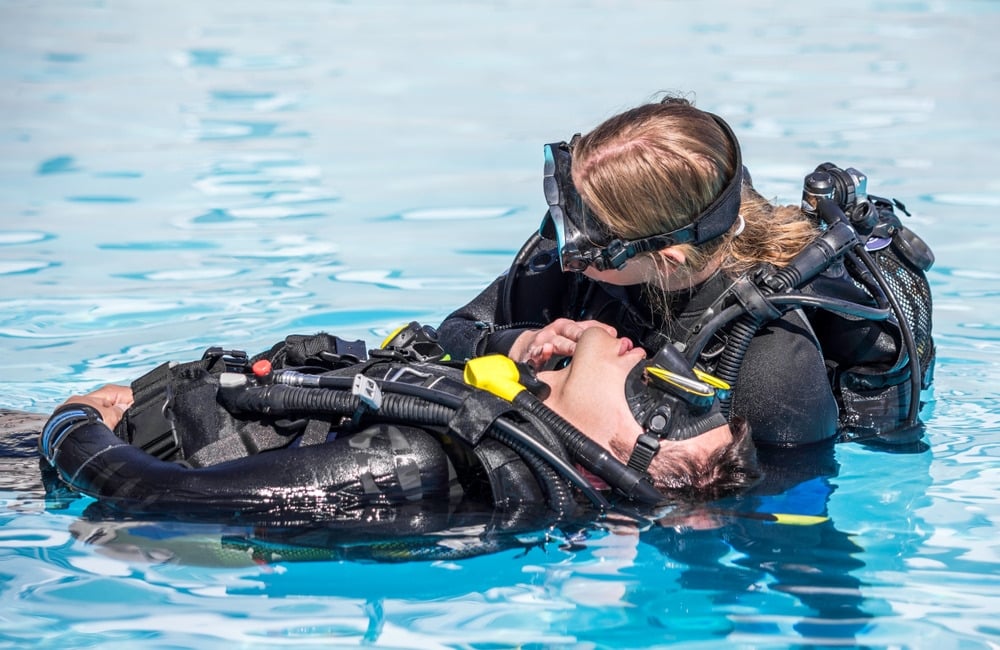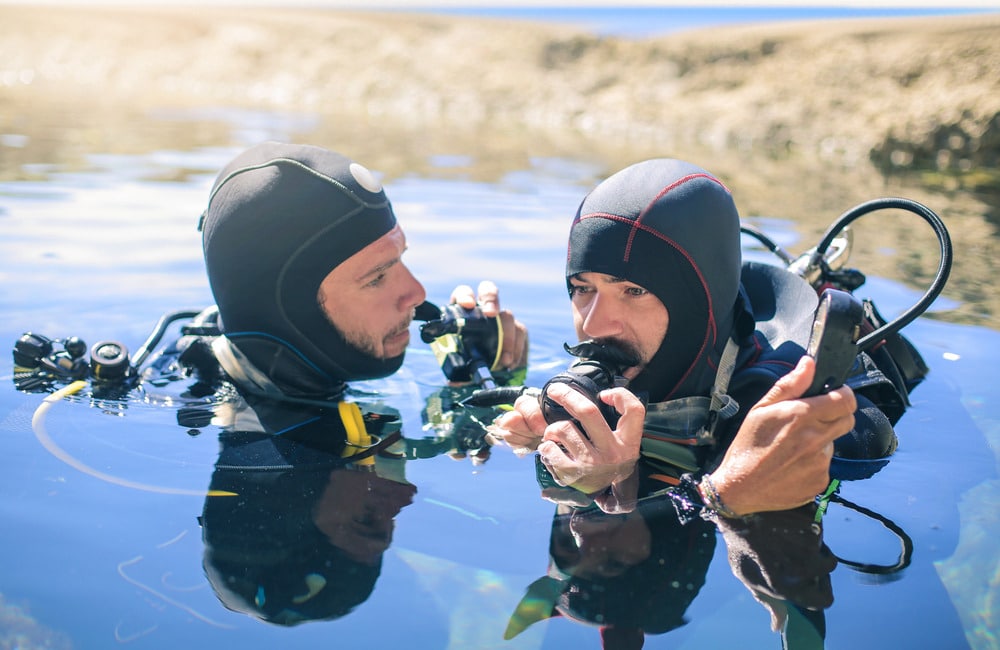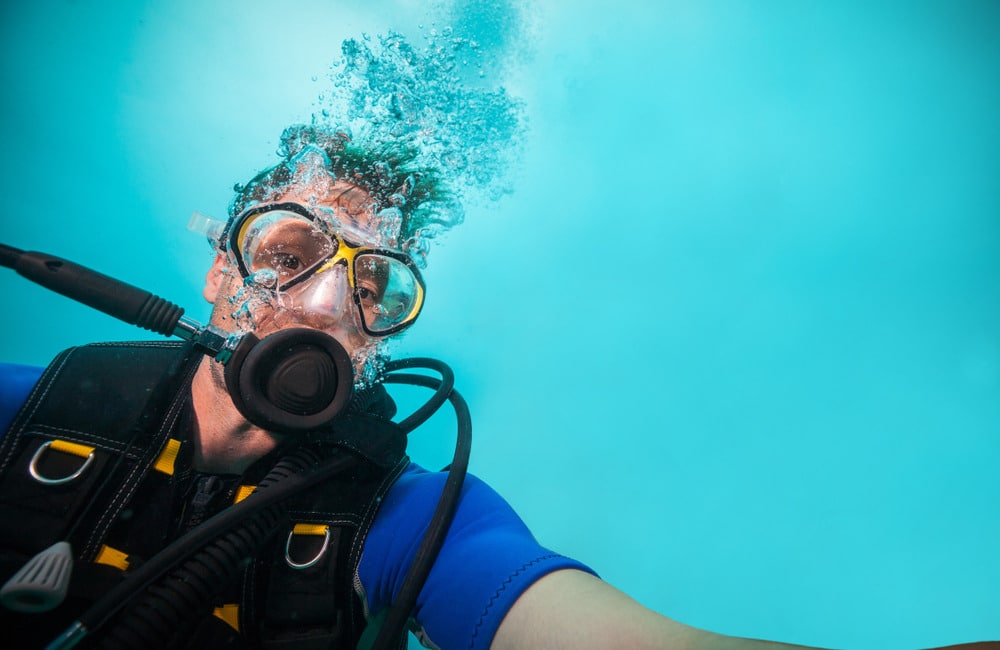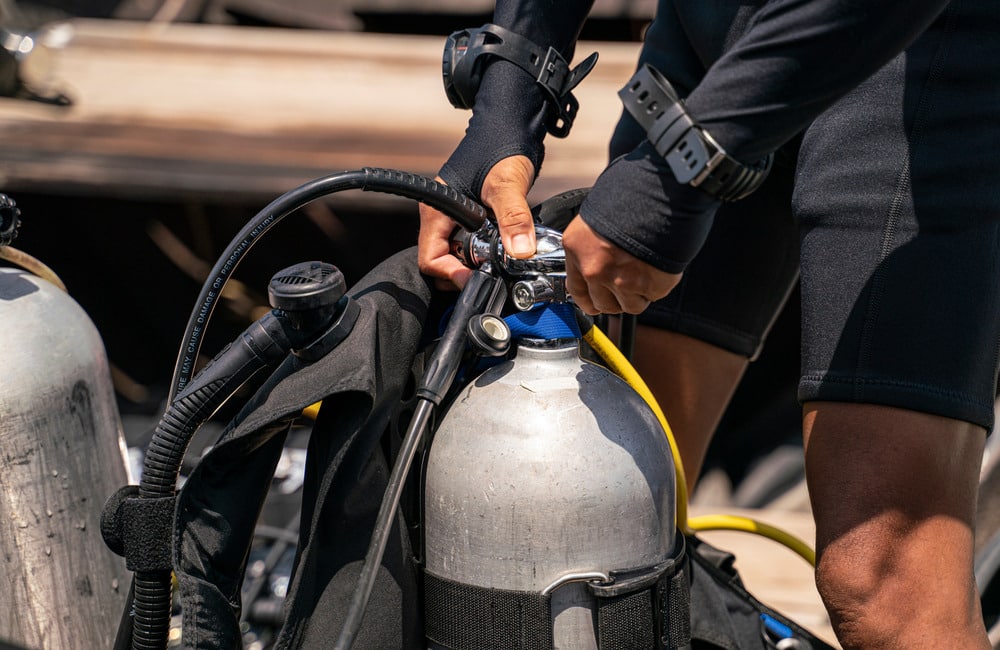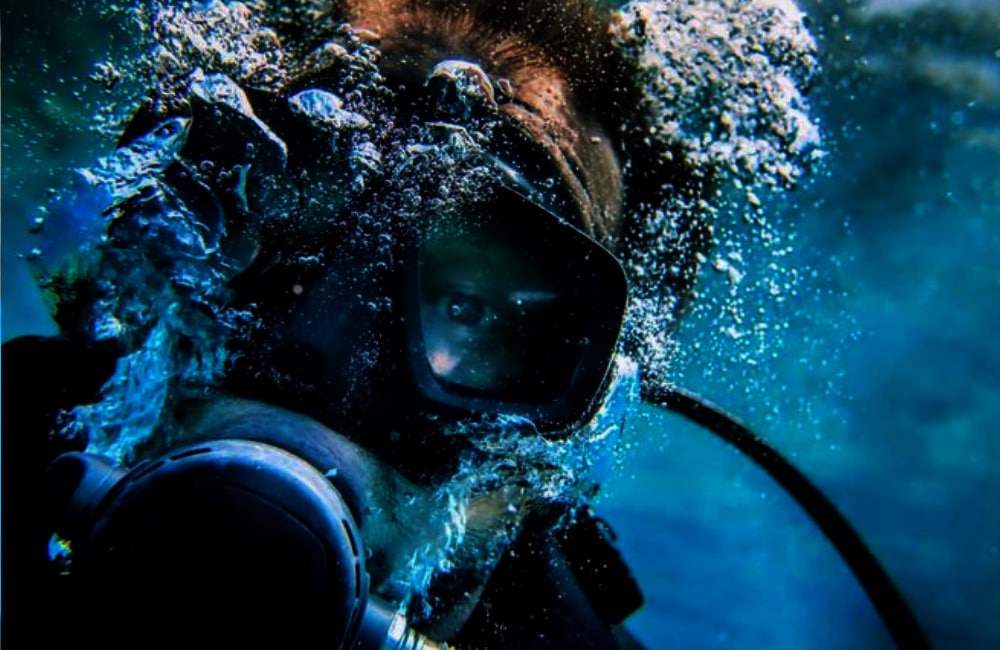Blog
How Do You Breathe While Scuba Diving?
Underneath the beautiful blue sea lies a whole new world of exploration, but in order to explore it and stay safe while doing so, it’s important to understand how breathing works when scuba diving. Diving with compressed air offers new horizons – literally.
But if you don’t know how to keep yourself well-oxygenated in the depths of the ocean, it can be dangerous for even experienced divers. In this blog post, we will discuss why breathing is different underwater, tips on proper breathing techniques during scuba dives and step by step instructions on managing your air supply safely.
Whether you’re brand new to diving or have been doing so for years, this article equipped with vital information and expert advice will help make your journey as smooth as possible – no matter how deep beneath the waves you venture.
Is It Hard to Breathe While Diving?
Diving can be an exhilarating experience. However, for many people, the thought of being submerged deep underwater can be daunting and even scary. One of the main concerns for beginner divers is whether it is hard to breathe while diving.
While it is true that the human body is not naturally equipped to breathe underwater, modern diving equipment, such as regulators and oxygen tanks, have made it possible for divers to breathe comfortably and safely while exploring the depths of the ocean.
Additionally, taking deep, slow breaths while diving can enhance the overall experience by allowing divers to fully appreciate the beauty of their surroundings. It is important for aspiring divers to receive proper training and follow all safety protocols to ensure that they have a safe and enjoyable diving experience.
Why is Breathing Control So Important While Scuba Diving?
Breathing control is a crucial technique that all scuba divers should master before venturing into the depths of the ocean. When scuba diving, one is faced with a hostile environment that can be life-threatening if safety protocols are not followed.
Breathing control is one such protocol that must be given top priority by all divers. Improper breathing techniques can lead to panic, rapid breathing, and a build-up of carbon dioxide in the bloodstream, which can put the diver’s life at risk.
However, with proper training and practice, one can learn how to control their breath and enjoy a smooth, relaxed dive. By regulating their breathing, divers can conserve their air supply, increase their bottom time, and have a more enjoyable experience underwater.
Overall, mastering breathing control is essential for any scuba diver who wants to have a safe and enjoyable dive.
How Do Scuba Divers Breathe?
Have you ever wondered how scuba divers are able to breathe underwater? Unlike most sea creatures that use gills to extract oxygen from water, divers carry equipment that enables them to breathe air from a tank. The apparatus consists of a regulator, which connects a tank of compressed air to a mouthpiece, and a mask that covers the nose and eyes.
The regulator reduces the high pressure of the air in the tank, delivering it at a lower pressure that is safe for inhaling. As divers descend into deeper water, the pressure increases, and the regulator automatically adjusts to maintain the air supply. Understanding the mechanics behind this essential equipment is crucial to ensure a safe and enjoyable diving experience.
Which Type of Gas Do Scuba Divers Use?
Most scuba divers use compressed air, which is a mixture of nitrogen and oxygen. However, some more advanced divers may opt for other types of gases, such as nitrox or trimix, to adapt to the depth and length of their dives. Nitrox contains a higher percentage of oxygen, making it useful for diving at shallower depths and longer durations.
Trimix is a mixture of three gases – nitrogen, oxygen, and helium – which is used for deep dives, as it reduces the risk of nitrogen narcosis and decompression sickness. Regardless of the gas used, every scuba diver must be aware of the gas’s properties and their effects on the human body to ensure a safe and enjoyable dive.
Tips to Improve Your Breathing While Diving 
Following are the tips to improve your breathing while diving. Have a look:
Practice Proper Breathing Techniques
When it comes to diving, proper breathing techniques are essential to maximize your experience. By practicing good breathing habits, you can improve your lung capacity, increase your endurance, and enjoy longer, more relaxed dives.
But what exactly are proper breathing techniques? It starts with becoming more aware of how you breathe and being mindful of your inhales and exhales. Slow, deep breaths will help you conserve air and remain calm under the water.
Remember to breathe in through your nose and out through your mouth, and try to keep your breaths steady and even.
Use Your Diaphragm
The key to controlling your breath is to engage your diaphragm. Using your diaphragm can improve your breathing technique and extend your dive time, allowing you to explore the underwater world for longer periods.
But what exactly is the diaphragm, you may ask? It’s a thin muscle below your lungs that helps move air in and out of your body. When you breathe, your diaphragm contracts and relaxes, allowing your lungs to fill with air.
Using your diaphragm increases your lung capacity, aiding in better air consumption and avoiding the gasp-reflex. So, next time you’re diving, engage your diaphragm, take steady, deep breaths, and enjoy the wonders of the ocean.
Maintain a Relaxed State
It’s essential to maintain a relaxed state to improve your breathing. Many beginner divers often focus on trying to take deep breaths rapidly, thinking that it will help them breathe better. However, this can lead to hyperventilation, which can cause dizziness, lightheadedness, and even unconsciousness.
Instead, maintaining a calm, relaxed state while diving can help you breathe better and dive for more extended periods. It’s crucial to slow down, focus on your breath, and breathe continuously and deeply. With every exhale, try to release any tension in your body, allowing your muscles to relax and your breathing to become more natural and efficient.
Equalize Regularly
Equalizing is the process of balancing the pressure within your ears and sinuses with the surrounding water pressure. This helps to prevent discomfort, pain, and even potential injuries.
Equalizing regularly ensures that you are consistently regulating the pressure changes as you descend and ascend. It’s an essential technique to master to have a safe and enjoyable diving experience. Remember, taking the time to equalize regularly during your dive can also improve your breathing and make your time underwater more relaxing.
Master Buoyancy Control
Mastering buoyancy control is an important skill to improve your breathing while diving. When you are able to maintain neutral buoyancy, you use less energy to stay at your desired depth, allowing you to breathe more easily and conservatively. This means longer dive times and a more comfortable and efficient dive.
Buoyancy control also ensures that you do not accidentally damage marine life or disturb the underwater environment. By taking the time to learn and practice proper buoyancy techniques, you can become a better, safer, and more responsible diver. So next time you hit the water, focus on your buoyancy control and enjoy a more relaxed and enjoyable dive.
Improve Fitness and Lung Capacity
One way to boost your lung capacity and improve your diving experience is to practice different breathing exercises regularly. Deep breathing exercises allow you to take in more oxygen and breathe out more carbon dioxide, which helps your body to function more efficiently. Another great tip is to focus on breathing through your mouth instead of your nose, which can restrict airflow and make it harder to breathe.
Practice Mindfulness and Relaxation Techniques
Practice breathing exercises such as deep diaphragmatic breathing to enhance your lung capacity and control your breathing patterns. Mindfulness can help you remain calm and focused underwater, allowing you to conserve energy and navigate the dive with ease.
Consider meditation or yoga to improve your ability to stay present in the moment and avoid distractions while diving. By implementing these techniques, you’ll be able to take fuller, more relaxing breaths and enjoy your diving experience to the fullest.
Monitor Your Air Supply
Monitoring your air supply is a crucial tip to improve your breathing while diving. By doing so, you can keep track of how much air you have left and ensure that it is free of contaminants. As you descend deeper into the water, the air density changes, which can sometimes cause difficulty breathing.
Monitoring your air supply can help you stay aware of your breathing patterns and regulate them accordingly. Additionally, ensuring that your scuba tank is regularly serviced and maintained can increase the quality of the air you’re inhaling, ultimately improving your diving experience.
Dive Within Your Limits
One key tip is to always dive within your limits. This means understanding your physical abilities and knowing when to take a break or slow down. By avoiding overexertion, you can conserve your energy and prevent the onset of stress and anxiety which can negatively impact your breathing. Take the time to assess your physical and mental state before each dive, and plan accordingly. Remember, your safety and well-being always come first.
Dive with an Experienced Buddy
Diving with a knowledgeable and skilled buddy is essential for any diving enthusiast to improve their breathing. It is a crucial factor in determining how much air is used up during the dive, your comfort level, and ultimately your safety underwater.
By diving with a partner who has been diving for a longer time and has better experience, you can observe and learn from their breathing techniques. They can give you valuable pointers on how to improve your overall breathing, leading to better conservation of air, slower respiration rates, and a more enjoyable and safe diving adventure.
With constant practice and guidance from your experienced buddy, you will become a more confident and relaxed diver with better air management skills.
